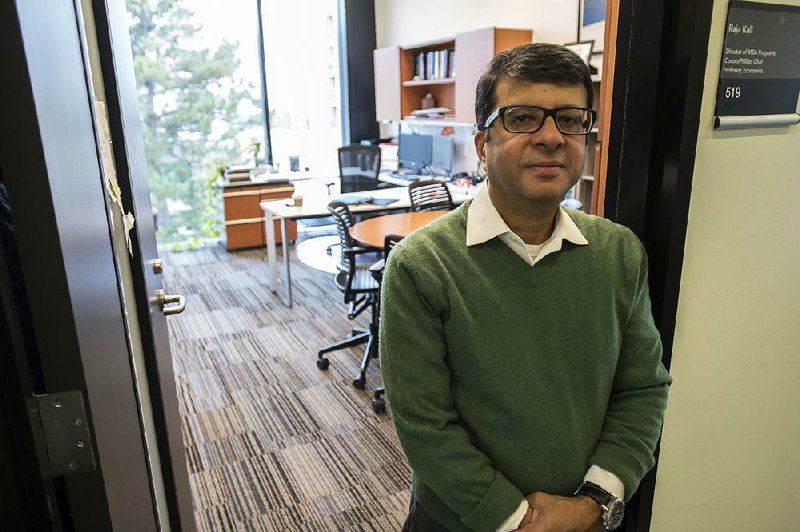Awards like “Employee of the Month” likely won’t motivate workers as much as employers would want and in some cases do the opposite, according to a recent study.
The new study, co-written by a professor at the University of Arkansas at Fayetteville, indicates that nonmonetary incentives — things like a favored parking space, a trophy, or a plaque — might actually result in the employee performing worse, in effect choking in high-pressure situations. That’s contrary to historical findings that nonmonetary incentives encourage employees to better performance.
“Normally we think these type of things are great,” Raja Kali, professor of economics at the UA’s Sam M. Walton College of Business, said in a recent interview. “But high-power incentives can be counterproductive.”
Kali, along with colleagues from Canada’s HEC Montreal business school, used data from top golfers as they tried to qualify for the Ryder Cup team from 1996 through 2012 as their primary research tool. At the Ryder Cup, top golf pros compete for an opportunity to represent their country, without any direct monetary incentive, not even endorsement deals.
Kali said the research findings, published in the Journal of Economics & Management Strategy, showed that seeking glory can actually impede performance.
For the study, the researchers defined glory as a desire for greater status, social esteem and respect.
“People are, in fact, choking,” Kali said.
The findings were somewhat surprising said David Pastoriza Rivas, associate professor at the department of international business at HEC Montreal and co-author of the study.
“PGA Tour golfers have shown to play better when tournament purses are higher,” Pastoriza Rivas said in response to emailed questions. “Our findings that PGA Tour golfers perform worse when competing for a non-monetary incentive (such as classifying for the USA Ryder Cup team) — is thus counter intuitive. Although this Ryder effect seems to affect everyone, the players who are affected the most are those who are trying to qualify for the Ryder Cup team for the first time in their careers.”
ATHLETES AND EXECUTIVES
The researchers looked at play during the two-year period prior to each Ryder Cup where points are gained based on performance in tournaments on the PGA Tour. The first year, the points gained for wins are not as high as they are for winning the same tournament for the second year, even though all the other aspects of the games are equal. The study didn’t look at Ryder Cup play itself but instead looked at performance to qualify for the U.S. team.
Kali said many economic theories can be tested using athletic performance data, and said sporting events allow researchers to look at performance in a more controlled environment with fewer complications. He said professional athletes are not so different than highly-paid corporate executives or top sales people.
“It’s like a lab,” he said.
Erik Charles, vice president, product marketing for San Jose, Calif.-based Xactly Corp., which offers software and services focusing on sales performance, compensation and employee engagement, said the researchers’ use of golf was wise since it serves as a solid, objective measure of performance.
He said the findings might better reflect high-performing sales professionals, rather than typical top-tier executives because sales people, in broad terms, tended to be individual contributors, those whose performance isn’t generally based on a large team of supporting employees.
“Golfers stand alone,” Charles said.
He said the study’s findings counter a common belief that nonmonetary rewards are generally beneficial, and that they could actually be causing workers to perform poorly in some, high pressure, situations.
“I think it will surprise some people to realize they can be driving bad behavior.”
TIMING
Kali explained that by looking at the results of the players’ performance during the two years’ time the researchers could compare tournaments with the same prize money but different nonmonetary incentives, Ryder Cup points in this case, to examine the difference.
According to the report, “We find that elite, highly-paid professionals who compete for glory under-perform, and that under-performance intensifies as pressure increases.”
Bob Nelson, author of 1501 Ways to Reward Employees and Recognizing and Engaging Employees for Dummies, said in response to email questions that it’s difficult to extrapolate a study of elite golfers to a broader population. He said he agrees that while some non-monetary incentives, such as plaques, rings and employee of the year competitions, are typically not effective in motivating employees today, other nonmonetary incentives asking employees for input and opinions, and granting them more autonomy bolsters relationships with managers and helps keep workers motivated.
Kali said the Ryder Cup was unique for several reasons including its importance to players. It’s the oldest competition for national golfers and includes the most elite players but there’s also no prize money to be won, compared with a regular PGA tournament with an average purse of more than $6 million. It also has the aspect of team play, where U.S. golfers go against the best players from Europe. Players aren’t allowed to wear logos at the Ryder Cup and qualifying players must make a donation to a charity.
According to the PGA, since 1999 when the U.S. Ryder Cup Outreach Program began, more than $20 million has been donated on behalf of U.S. Ryder Cup team to more than 160 charities.
A quote from golf legend Arnold Palmer in the study sums up the appeal of the Ryder Cup: “I loved the Ryder Cup, because it simply wasn’t about playing for money. It was about playing for something far grander and more personal than income and money lists. It was all about playing for your country, your people, and therefore yourself.”
Kali said his research shows that for some, seeking glory can be a stumbling block.
“Sometimes nonmonetary incentives can backfire,” he said.

